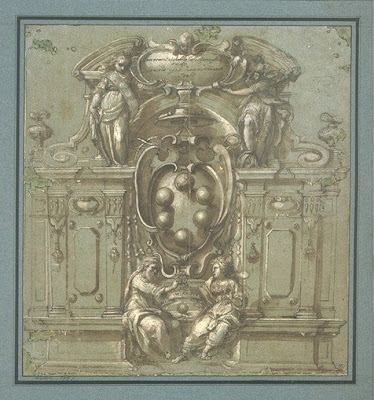 |
| Alessandro Algardi Allegory of Rome before 1654 drawing Musée du Louvre |
 |
| Alessandro Algardi Design for Decorative Element with Emblems of the Albergati of Bologna before 1654 drawing Musée du Louvre |
 |
| Alessandro Algardi Design for Vase with Arms of the Albergati of Bologna before 1654 drawing Musée du Louvre |
 |
| Anonymous Dutch Artist Allegory of Rome 16th century drawing Musée du Louvre |
 |
| Bernardino Gatti Mythological Scene ca. 1550 drawing Musée du Louvre |
 |
| Alessandro Turchi Allegorical Scene - Bacchic Figure pressing Grapes into Goblet before 1649 drawing Musée du Louvre |
 |
| Pierre Mignard Studies for Allegory of Faith ca. 1692 drawing Musée du Louvre |
 |
| Pierre Mignard Studies for Allegory of Faith ca. 1692 drawing Musée du Louvre |
 |
| Charles Le Brun Personification of the Seine ca. 1679-84 drawing (study for vault decoration, Château de Versailles) Musée du Louvre |
 |
| Louis Boullogne the Younger Allegory of Divine Love before 1733 drawing (study for fresco) Musée du Louvre |
 |
| François Lemoyne Personification of Time before 1737 drawing (study for thesis engraving) Musée du Louvre |
 |
| Louis-Claude Vassé Procession of Mythological Figures 1770 drawing Musée du Louvre |
 |
| François Masson Study for Arms of a Medici Cardinal 1797 drawing Musée du Louvre |
 |
| Pietro de Angelis Chariot of Ceres (Allegory of Fertility) ca. 1750-1800 drawing, with watercolor National Gallery of Art, Washington DC |
from Chivalric
Heraldry and all its lovely language;
I chose my time there learning
elsewhere, where else than land,
Landscape, and how to live, in it
is not like, nothing is like, the colors
or the snow, it is not like pearl and
it is not like the glitter of rainwater
that darkens the bark against which
the occasional bloom-laden branch
might be seen shedding petals. No.
Here is the past: One was once a boy
and read books and could not pronounce
the most engaging words and read
in silence under blankets. Here
one was not like oneself or was
quiet and wrong and did not know
the words nor how to ask, who
to ask. Nor why. Boy's books with flags.
Everyone's born to the language; anyone
can say something. For instance,
knight banneret, that's what she called him,
having no use for him after history,
she thrust him into the operatic night:
A woman's hand rose
above the surface of the lake and caught
the glistering sword, and slowly
descended into the boy's refuge,
his astonishment, so foreign, so little like home
Knights Baronets – inferior barons formed
by James I in 1611, the titles were sold
and the funds went toward the plantation of Ulster.
For this one would receive the right
to a Field argent, a sinister hand
couped the wrist gules.
– Bin Ramke (1999)